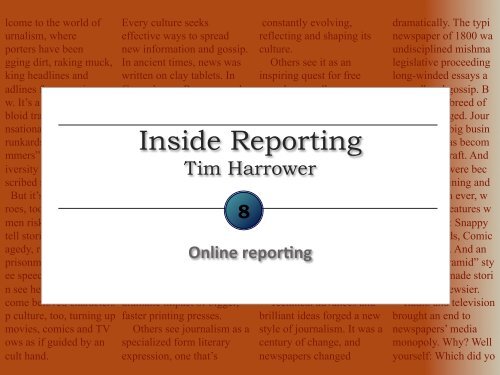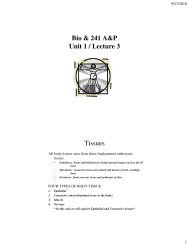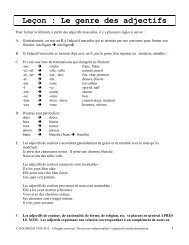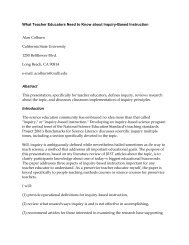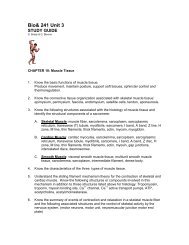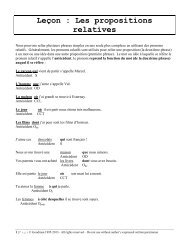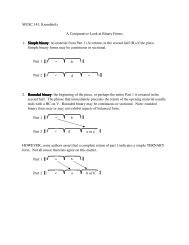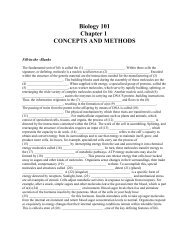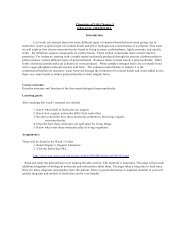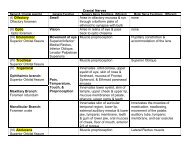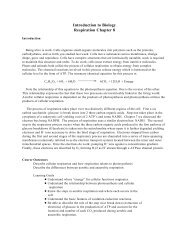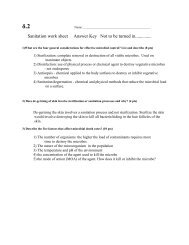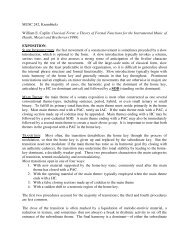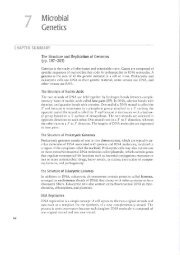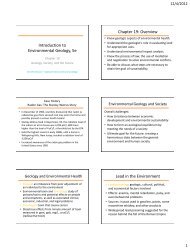Chapter 8
Chapter 8
Chapter 8
Create successful ePaper yourself
Turn your PDF publications into a flip-book with our unique Google optimized e-Paper software.
lcome to the world of<br />
urnalism, where<br />
porters have been<br />
gging dirt, raking muck,<br />
king headlines and<br />
adlines for centuries<br />
w. It’s a history full of<br />
bloid trash, of slimy<br />
nsationalists, of<br />
runkards, deadbeats and<br />
mmers” (as a Harvard<br />
iversity president once<br />
scribed reporters).<br />
But it’s a history full of<br />
roes, too: men and<br />
men risking their lives<br />
tell stories of war and<br />
agedy, risking<br />
prisonment to defend<br />
ee speech. And as you<br />
n see here, reports have<br />
come beloved characters<br />
p culture, too, turning up<br />
movies, comics and TV<br />
ows as if guided by an<br />
cult hand.<br />
Every culture seeks<br />
effective ways to spread<br />
new information and gossip.<br />
In ancient times, news was<br />
written on clay tablets. In<br />
Caesar’s age, Romans read<br />
newsletters compiled by<br />
correspondents and<br />
handwritten by slaves.<br />
Wandering minstrels spread<br />
news (and the plague) in the<br />
Middle Ages. Them came<br />
ink on paper. Voices on<br />
airwaves. Newsreels, Web<br />
sites, And 24-hour cable<br />
news networks.<br />
Thus when scholars<br />
analyze the rich history of<br />
journalism, some view it in<br />
terms of technological<br />
progress—for example, the<br />
dramatic impact of bigger,<br />
faster printing presses.<br />
Others see journalism as a<br />
specialized form literary<br />
expression, one that’s<br />
constantly evolving,<br />
reflecting and shaping its<br />
culture.<br />
Others see it as an<br />
inspiring quest for free<br />
speech, an endless power<br />
struggle between Authority<br />
(trying to control<br />
information) and the People<br />
(trying to learn the truth).<br />
Which brings to mind the<br />
words of A.J. Liefling:<br />
“Freedom of the press is<br />
guaranteed only to htose<br />
who own one.”<br />
In the pages ahead, we’ll<br />
take a quick tour of 600<br />
years of journalism history,<br />
from hieroglyphics to<br />
hypertext: the media, the<br />
message and the politics.<br />
Technical advances and<br />
brilliant ideas forged a new<br />
style of journalism. It was a<br />
century of change, and<br />
newspapers changed<br />
Inside Reporting<br />
Tim Harrower<br />
8<br />
Online repor*ng <br />
dramatically. The typi<br />
newspaper of 1800 wa<br />
undisciplined mishma<br />
legislative proceeding<br />
long-winded essays a<br />
secondhand gossip. B<br />
1900, a new breed of<br />
tor had emerged. Jour<br />
had become big busin<br />
Reporting was becom<br />
disciplined craft. And<br />
newspapers were bec<br />
more entertaining and<br />
essential than ever, w<br />
most of the features w<br />
expect today: Snappy<br />
headlines, Ads, Comic<br />
Sports pages. And an<br />
“inverted pyramid” sty<br />
writing that made stori<br />
tighter and newsier.<br />
Radio and television<br />
brought an end to<br />
newspapers’ media<br />
monopoly. Why? Well<br />
yourself: Which did yo
From print to the Web <br />
Media convergence <br />
Online storytelling op9ons <br />
Wri9ng for online media <br />
2
Electronic newspapers may replace deadtree<br />
newspapers!<br />
Online media offers readers <br />
more variety and control <br />
Naviga9on crucial factor <br />
3
Arranging stories!<br />
Tradi9onal papers <br />
• Online news sites<br />
4
To fulfill the potential of new media!<br />
Need to develop new ways to <br />
tell stories. <br />
Tomorrow’s journalists will <br />
plan and produce news <br />
stories in different ways. <br />
5
Navigating online news sites!<br />
Timeliness <br />
Print uses large photo to <br />
catch eye; Web uses <br />
smaller image <br />
Print uses smaller text; <br />
Web uses larger text <br />
6
Navigating online news sites!<br />
Home page is gateway to <br />
online news <br />
Must be comprehensive <br />
Must be easy to navigate <br />
Compelling headlines for <br />
links <br />
7
The role of the journalist is changing along<br />
with the media !<br />
Gatekeeper (past) <br />
Navigator (present)<br />
Journalist shares with <br />
readers informa9on to <br />
which only she has <br />
access. <br />
Journalist helps to<br />
guide readers through<br />
an ever-increasing body<br />
of information on a<br />
specific topic.<br />
8
Key home page elements!<br />
Time/date <br />
Index <br />
Lead story <br />
Page design for single-screen<br />
display <br />
Naviga9on buXons <br />
• Search engine<br />
• Ads/promotions<br />
• Interactive extras<br />
• Links<br />
• Footer<br />
9
Technological innovations transforming<br />
21 st -century journalism!<br />
Newsroom <br />
convergence <br />
Journalists from <br />
different media share <br />
same workspace. <br />
Newsgathering<br />
convergence<br />
Reporters, editors and<br />
photographers<br />
collaborate on reports.<br />
10
Technological innovations…!<br />
Content convergence <br />
Final story combines <br />
Text. <br />
Images. <br />
Blogs. <br />
Podcasts. <br />
Slideshows. <br />
11
New forms of news deliveries!<br />
Use print to explain. <br />
Use mul9media to show. <br />
Use interac9ves to <br />
demonstrate and engage. <br />
12
Multimedia Interactive Links<br />
Video <br />
Audio <br />
Webcams and Webcasts <br />
Podcasts <br />
Animated graphics <br />
• Live chats <br />
• Reader feedback <br />
and comments <br />
• Online polls and <br />
quizzes <br />
• Downloads <br />
• Archives <br />
• Other Web sites <br />
• Organiza9ons <br />
• Editorials and columns <br />
• Addi9onal story <br />
elements <br />
13
BLOGS: a way to add viewpoints!<br />
Who creates blogs? <br />
Journalists <br />
Par9cipants in breaking news <br />
Bloggers who monitor what’s <br />
new and newsworthy <br />
Are blogs important? <br />
Everyone has a voice <br />
14
5 Tips for creating readable, user-friendly<br />
news stories for Web sites<br />
“Chunk” your informa9on. <br />
Tweak your type to make <br />
it easier to scan. <br />
Rethink what a “story” is. <br />
• Enhance your story with<br />
extra elements.<br />
• Collaborate.<br />
15
Online package planning guide!<br />
Photocopy page 161. <br />
Ask the team what’s this <br />
story really about. <br />
Summarize in 25 words or <br />
less. <br />
• Think like a reader.<br />
• Organize.<br />
• Distribute copies.<br />
16


